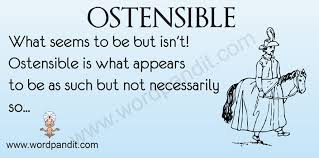记忆方法
1. os- "in front of" + tens- + -ible.
2. 字面含义:stretched to the front. => show, expose to view, exhibit, display.
3. => apparent, professed.
4. 也就是拉伸到前面、表面。
2. 字面含义:stretched to the front. => show, expose to view, exhibit, display.
3. => apparent, professed.
4. 也就是拉伸到前面、表面。
中文词源
ostensible 表面的,宣称的
os-,向前,朝向,-tens,伸出,延展,词源同extend,tense,content.引申词义宣称的,浮夸的,表面的。
英语词源
- ostensible
-
ostensible: [18] Ostensible means literally ‘that can be shown’. It comes via French from medieval Latin ostensibilis, a derivative of the Latin verb ostendere ‘show’ (itself a compound formed from the prefix ob- ‘in front of’ and tendere ‘stretch’, source of English extend, tend, tense etc). Its original meaning ‘showable’ survived into English (‘You should send me two letters – one confidential, another ostensible’, Jeremy Bentham, 1828), but seems to have died out by the mid-19th century.
Two metaphorical strands came with it, though. One, ‘vainly conspicuous’, goes right back to ostendere, and is still preserved in English ostentation [15], although it has disappeared as far as ostensible is concerned. The other, ‘presented as real but not so’, is today the central meaning of the adjective.
=> extend, ostentation, tend, tense - ostensible (adj.)
- 1762, "capable of being shown, presentable," from French ostensible, from Latin ostens-, past participle stem of ostendere "to show, expose to view; to stretch out, spread before; exhibit, display," from ob "in front of" (see ob-) + tendere "to stretch" (see tenet). Meaning "apparent, professed" is from 1771.
权威例句
- 1. The ostensible reason for his absence was illness.
- 他假托生病缺勤。
- 2. The ostensible reason wasn't the real reason.
- 表面上的理由并不是真正的理由.
- 3. The ostensible purpose of these meetings was to gather information on financial strategies.
- 这些会议声称旨在收集有关金融策略的信息。
- 4. Morris Townsend though he was by no means ostensible, was the real occasion of the feast.
- 尽管没有讲明,莫里斯·汤森德显然是这场宴请的真正目标.
- 5. He resigned secretaryship on the ostensible ground of health.
- 他借口身体不好,辞去书记的职务.
